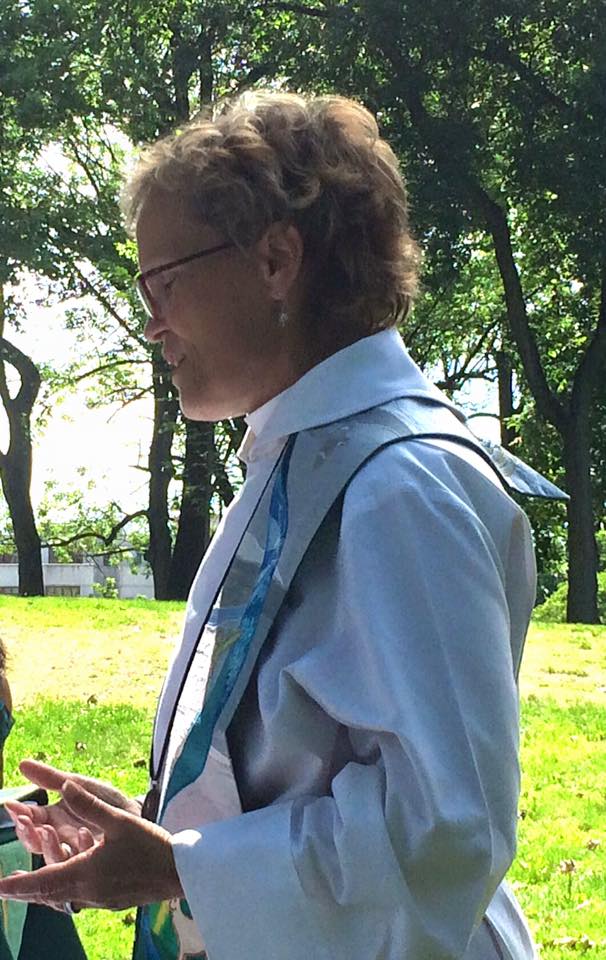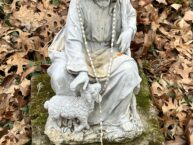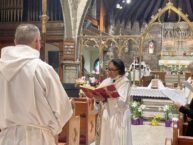 June 14, 2015 – Mass on the Grass…with Brass: May God’s words alone be spoken, may God’s words alone be heard. Amen.
June 14, 2015 – Mass on the Grass…with Brass: May God’s words alone be spoken, may God’s words alone be heard. Amen.
I love being out here in the middle of this beautiful park – surrounded by the beauty of God’s creation. I especially am so grateful to hold worship out here, not only because of the beauty, but because of something even more powerful.
The beauty of a church is a wonderful thing – ours is certainly one of the most beautiful I have ever seen. Church provides a sense of the sacred – it doesn’t look like the office, or the house, or a million other places we tend to run back/forth to do things in or at… the building we call the church stands against the pulls of modern time – almost bidding us to slow down, to look, to sense, to feel, to listen.
But… a church building is not where we find God…or I should say, it is not the only place where we find God. And so here we are today, in church, and also the church – experiencing God in creation and in community. It is an unexpected place to find us at this hour on a Sunday, but then again, if we have learned anything from scripture it is that relationship with God is full of the unexpected. Just look at our readings for today.
Jesus tells two stories or parables to explain the kingdom of God to his followers. In the first story, a sower throws down seed, and it grows, but he doesn’t understand why. But even more bizarrely, in the second one, Jesus says that the kingdom of God is like a mustard seed. Now, this is where Jesus is showing his sense of humor, or at least irony, because the mustard plant was to the people in those days like dandelions and other weeds are to us today. In Jesus’ day – the image of almighty God was usually equated in nature with the cedar, not some pesky weed. Specifically, the cedar of Lebanon. But almost snarkly, Jesus says, “the kingdom of God is like a mustard seed, that grows into greatest of all shrubs.” I mean, if Jesus said “The Kingdom of God is like the dandelion. Small and yellow, but when it spreads across your lawn, it is beautiful.” How would you react? Jesus must have had them rolling in the aisles with that one. Only – he was serious. Their perception about what is true, about how things work, was being turned upside down. They were finding out that looks can be deceiving.
I read a story the other day about a woman who was walking with her friend on a nice summer day, probably a day very much like this one. She writes, “I stood by the edge of a pond, looking at a frog floating motionless on top of the water. I pointed out the dead frog to my friend, who replied, “That frog’s not dead.” I said that it surely was dead and, in the face of her failure to see the truth, finally spoke with authority: “That’s the deadest frog I’ve ever seen.” At which point, of course, the frog leapt out of the water. I now have a circle of friends and family who will simply say to me: “That’s the deadest frog I’ve ever seen” when I speak with a degree of certainty about that which is not certain.”[1]
Well, I think we’ve all been in her shoes at one point or another, judging solely on the look of a thing or a person. So in using this inane example of the lowly mustard seed, Jesus was overturning tables again, which he tends to do – leaping over our stubbornness like that frog, shattering our human small mindedness, breaking apart our arrogance, and turning our expectations of how God works upside down. Why?
Well, because, as you can imagine with anything he does, the stories he tells in today’s gospel are about more than seeds growing into plants. They are far more powerful than that. These are parables about who we are, what God is doing in the world, and how we are called to participate in that creative work. These are parables about you and me, about the homeless on the street, about the people divided by war, about the marginalized and the oppressed, and about how God is at work in the world. We don’t know how the earliest disciples reacted immediately to this parable, or any of the descriptions of the Kingdom of God that Jesus proclaimed to them, but when they understood it, it must have knocked them over (and maybe that is why Jesus explained the parables to them in private – so he could say “are you okay, or do you always fall off your chair like that James?).
The question for us today is…How would you react? How would you react to know that the Kingdom of God is happening all around us – and we have a part to play in it? Ahhh – see, that is where it gets interesting, right? That’s the power of these parables – and we have turned this incredibly subversive, life-changing, empowering, and revolutionary message into a watered down story about having a little bit of faith.
Why? Why would we do that? A flaw of literalism – yes, perhaps. But maybe it’s because the idea might scare us out of our wits. It’s easier to think that God is that other – that divinity – that we call on to say thanks or to ask for things. It is something outside of ourselves, powerful – yes, but still unseen. The Kingdom of God reduced to life after this one.
But in so many ways, scripture reminds us that the creative work of God is continually in motion all around us. The Holy Spirit is always on the move. “The earth produces of itself” the gospel says. It is going to happen no matter what we do…or perhaps, in spite of what we don’t do. It’s how we engage with it, how we open ourselves to it to create something new – to bring about the kingdom – that is the powerful message being proclaimed .
Stephen King, the author who, quite honestly, scares the crap out of me, once said to a classroom of hopeful future authors this about his creative process, “Let’s get one thing clear right now, shall we? There is no Idea Dump, no Story Central, no Island of the Buried Bestsellers; good story ideas seem to come quite literally from nowhere, sailing at you right out of the empty sky: two previously unrelated ideas come together and make something new under the sun. Your job isn’t to find these ideas but to recognize them when they show up. (King, p. 37)
I think that is a great description of the Kingdom of God here – now. We don’t create it, but we are called to listen for it, recognize it, and then to step into it, to be a part of it, to actively participate with the Spirit in her ongoing work in the world. To pull the pieces together that God provides to us. The parables Jesus tells in the gospel today is another reminder, as we have heard these past few weeks, that God is at work in the world. We just have to open our hearts and minds to see it all. God calls each one of us – you and me – to join in the work God is already doing all around us.
The power of these parables is to remind us of something we have lost over time. That each one of us has the power to change the world, to bring about the kingdom of God – here, now. How radical is that! But the problem is, we don’t believe it. To us, “That’s the deadest frog we’ve ever seen”
We so often think that we have to be rich, or good looking, or have great luck, or any numbers of things, for us to make a difference in the world. After all, we say, what can I do. I am only one person – one very busy person. Our Hollywood super heroes don’t help either. Have you noticed – they are rarely short, balding, female, overweight, gay, black, Asian, Muslim, Jewish, or in any other way out of the stereotypical normative box. Heck, we even try to make Jesus look all buff any time he is depicted in the movies – like there was a member of the Galilee YMCA. I wonder how folks would feel if a movie came out with Jesus being bald, chubby, or even – gasp – gay!
Nope – we like our super heroes to be – well, super sized. Not at all like us. And we’ve done that to Jesus too. We’ve made him into such an unreachable image of Godly perfection that we have lost sight of his humanity. And in the process, we lost sight of our own power as children of God. We couldn’t possibly measure up.
Now, I haven’t mentioned the Hebrew lesson for today, but it is an important one because it is exactly about this very thing. Samuel is sent to find the next king after the death of Saul, and he is told it will be one of the sons of Jesse. As each son is brought before him (sort of like some kind of kingly beauty pageant), Samuel looks at these handsome guys and thinks “this must be the one – he would look so kingly on that throne!” Why – because, dang they looked good. But God says to him, “Do not look on his appearance or on the height of his stature, because I have rejected him; for God does not see as mortals see; they look on the outward appearance, but God looks on the heart.” In other words, God was looking for a nice guy, good sense of humor, who likes long walks in the rain. Seriously though – God ends up choosing the youngest, a small ruddy but handsome sort – David. David as we know is anything but perfect. A deeply flawed character if ever there was one, but a colorful one too – one with a zest for life. He slays Goliath (which we hear about next week), has an intimate relationship with Jonathan (something the church usually tries to gloss over), then later an adulterous one with Bathsheeba, not to mention engineering the murder of her husband. And yet – despite his outward appearance, and his very human like ways, he became an instrument of God’s work in the world. God chose him.
And guess what – God is choosing you too. Jesus was talking about you in these parables. You and God. In the first parable, you are the sower, “the ones who toss seed, yet seem to have no real understanding of the growing process — but that doesn’t matter in the parable, because the sower trusts that harvest will come. He doesn’t know how the growth occurs, but he knows that it does.”[2] See, the thing is, that is what faith it all about, right? We don’t fully understand God, or know the fullness of the divine, or how God works, but we see the results – we experience God in our lives and in the world around us.
And in the second parable, you are the mustard seed – the unlikely, humble, even sometimes reviled in the world people who, with God’s help, will feed and shelter others in your mighty branches. Talk about super heroes – you’all need to go get fitted for some tights and a cape. Okay, maybe we should NOT go there. But the point is, “the mustard seed and the shrub it becomes are unlikely representations of the kingdom of God, are they not? Now let’s not try to make the mustard plant into something bigger and stronger than it is — Jesus found it perfectly useful and capable of bearing the image of the kingdom of God just as it was.”[3] And Jesus is telling us that we are capable of bearing the image of God just as we are…well, because we are made in the image of God. Made in the image of God with all our unique quirks, our challenges, and our failings. But we find it hard to imagine, hard to see in the mirror, don’t we.
There is a Native American story that I think is best told in an environment such as this:
The Creator gathered all of Creation and said, “I want to hide something from humans until they are ready for it. It is the realization that they create their own reality. “ The eagle said, “Give it to me, I will take it to the moon.” The Creator said, “No. One day they will go there and find it.” The salmon said, “I will bury it on the bottom of the ocean.” “No. They will go there too.” The buffalo said, “I will bury it on the Great Plains.” The Creator said, “They will cut into the skin of the Earth and find it even there.” Grandmother Mole, who lives in the breast of Mother Earth, and who has no physical eyes but sees with spiritual eyes, said, “Put it inside of them.” And the Creator said, “It is done.”
We don’t seem to be able to imagine ourselves as agents of God – made in God’s image – powerful enough to change the world. But that, my friends, is exactly the radical message Jesus is proclaiming. God is at work in the world now, not safely hidden away inside the walls of our churches on a Sunday. Yes, we encounter God in church, and we are nourished and fed there too, encountering Christ in one another – and we need that! But we can’t box God into that experience – or even into the Episcopal Church, or for that matter, Christianity. God is calling us to step into the church, the synagogue, the mosque, the temple, but not to linger there. We must go… go back out into the world where God is spreading seed. To engage in the work already happening – not only in our houses of worship, but in the dark corners…the places where those who see themselves only as small seeds in the darkness of the dirt we have tossed upon them. That is where we are called to nourish, to feed, to shelter, to spread God’s love.
But wait, didn’t the sower do nothing in the first parable? Doesn’t that mean God will provide?
Ahhh, this is the best part. Because we are not only the sower in that parable…we are the work of God helping the seed to grow. Made in God’s image, and called to walk as Christ walked, we are active agents in the world – or at least – we are supposed to be. It is who we are – who were were born to be. Or to quote Lady Gaga “We were born that way!” Imagine that! We were born to spread God’s all inclusive love – the food of life – to a hungry world. How awesome is that!!
And that is why I love the words on the sign we have here today, because that is what we are all about – what everyone on this earth is called to do:
Love God. Love our Neighbor. Change the World.
You have the power to do it. It is within each and every one of you. It doesn’t require you to go to the gym.
You don’t have to have money, look like a super model, or leap tall buildings in a single bound.
You just need to be the small seed, to be the scraggly branchy shrub, planted by God.
You just need to be nothing more than what God created you to be – the wonderful and powerful you – out there changing the world, one little nesting bird at a time.
Amen.
[1] Mary Ragan. On Certitude and Frogs. Trinity News. Summer 2014. Vol. 61, No. 2, pg. 14.
[2] homileticsonline.com Used with permission.
[Sermons as written may not be as delivered on any given Sunday]Rev. Diana L. Wilcox
Christ Church in Bloomfield & Glen Ridge
June 14, 2015
3rd Sunday After Pentecost – Mass on the Grass with Brass
Proper 6 – Track 1
1st Reading – 1 Samuel 15:34-16:13
Psalm 20
2nd Reading – 2 Corinthians 5:6-10, 14-17
Gospel – Mark 4:26-34






